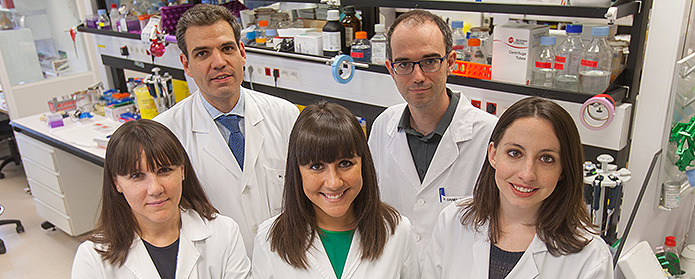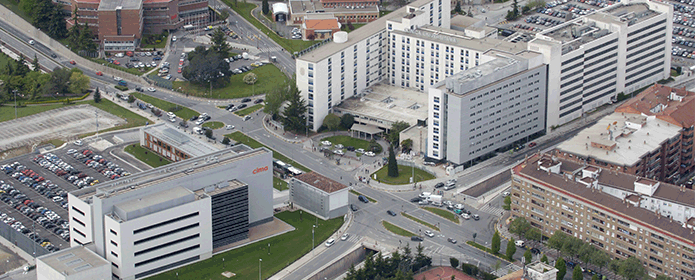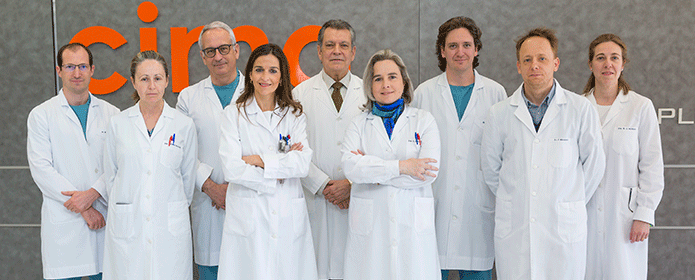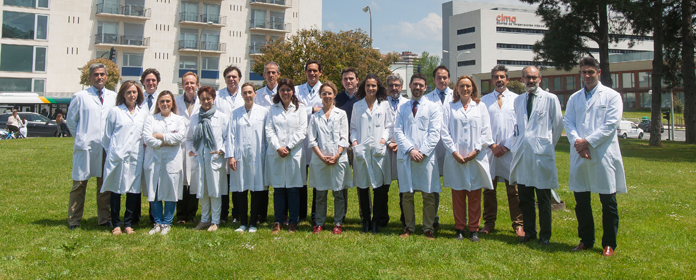New target against liver metastases in lung cancer patients identified
By acting on the Id1 gene, it is possible to reduce tumor cell progression and increase survival. increase survival

Scientists at the Clínica Universidad de Navarra and research center Applied Medicine (CIMA) have developed a research whose results reveal that high levels of the Id1 gene contribute to the proliferation of lung cancer cells and favor their migration (cellular capacity to move and spread over distance). In contrast, inhibition of Id1 in these cells significantly reduces the rate of metastasis to the liver, thereby increasing survival. These findings make this factor, for the first time, a new therapeutic target in the fight against the spread of non-small cell lung cancer (NSCLC). Id1 is an inhibitor of cell differentiation that is part of a protein group that contributes to the growth and spread of tumor cells.
The results of the research directed by Dr. Ignacio Gil Bazo, director of the department of Oncology of the Clínica Universidad de Navarra, have been published in the last Issue of the international scientific journal of maximum impact of the specialization program Cancer Letters. These results "allow us to dream of a highly effective targeted treatment against this and other factors that favor the generation of metastases, which ultimately cause the death of lung cancer patients," emphasizes Dr. Gil Bazo.
The findings of this study, which has received partial funding from the Ministry of Economics and Competitiveness, are the result of the work multidisciplinary of clinical and basic researchers of the department of Oncology of the Clínica Universidad de Navarra and the CIMA and has counted with the partnership of researchers from university centers and hospitals in Spain, Belgium, Switzerland and the United States. The research team is composed of Dr. Eduardo Castañón, Marta Román, José María López-Picazo, Iosune Baraibar and Ignacio Gil Bazo, from Clínica Universidad de Navarra; Inés López, Margarita Ecay, María Collantes, Miriam Redrado and Alfonso Calvo, from CIMA; Alex Soltermann and Walter Weder, from the University Hospital of Zurich in Switzerland; Christian Rolfo, from the University Hospital of Antwerp in Belgium; Fernando Vidal-Vanaclocha, from the Catholic University of Valencia; and Luis Raez, from Florida International University (USA). Likewise, this work is within the lines of research of the high school of research Sanitaria de Navarra (IDISNA) and of the network CIBERONC at national level, to which Dr. Gil Bazo and his team belong.
Late detection and ineffective systemic therapiesLung cancer is currently the leading cause of cancer-related mortality worldwide. The reason for its high mortality rate is due, on the one hand, to its high incidence and, on the other, to the fact that it is usually diagnosed in advanced stages of the disease in the brain, bone, adrenal glands and liver, mainly, and the available treatments do not cure the majority of patients, the researchers argue.
Liver involvement in patients with NSCLC is in the range of 20-40% of patients during the course of the disease and confers a worse prognosis and poorer quality of life.
More Id1, lower survivalIn line with the need to find new therapeutic strategies against this disease, the researchers turned their attention to inhibitor of differentiation 1 (Id1), a protein that contributes to the growth of tumor cells and their spread to other organs. The group of research of the Clínica Universidad de Navarra and the CIMA proved, in a previous research , that the high presence of this Id1 factor in patients with non-small cell lung cancer "is significantly correlated with a reduction in overall survival," says Dr. Ignacio Gil Bazo.
Based on this evidence, the scientists hypothesized that the Id1 marker would play a critical role in the spread of lung cancer to the liver. They observed that low levels of Id1 in lung cancer cells in an animal model "significantly reduced cell proliferation and migration in vitro," says Dr. Alfonso Calvo, co-director of work and researcher of the University of Navarra and CIMA. In their work they verified that by eliminating the presence of this protein in animals with these tumors, "they were able to stop hepatic colonization and significantly increase survival".




